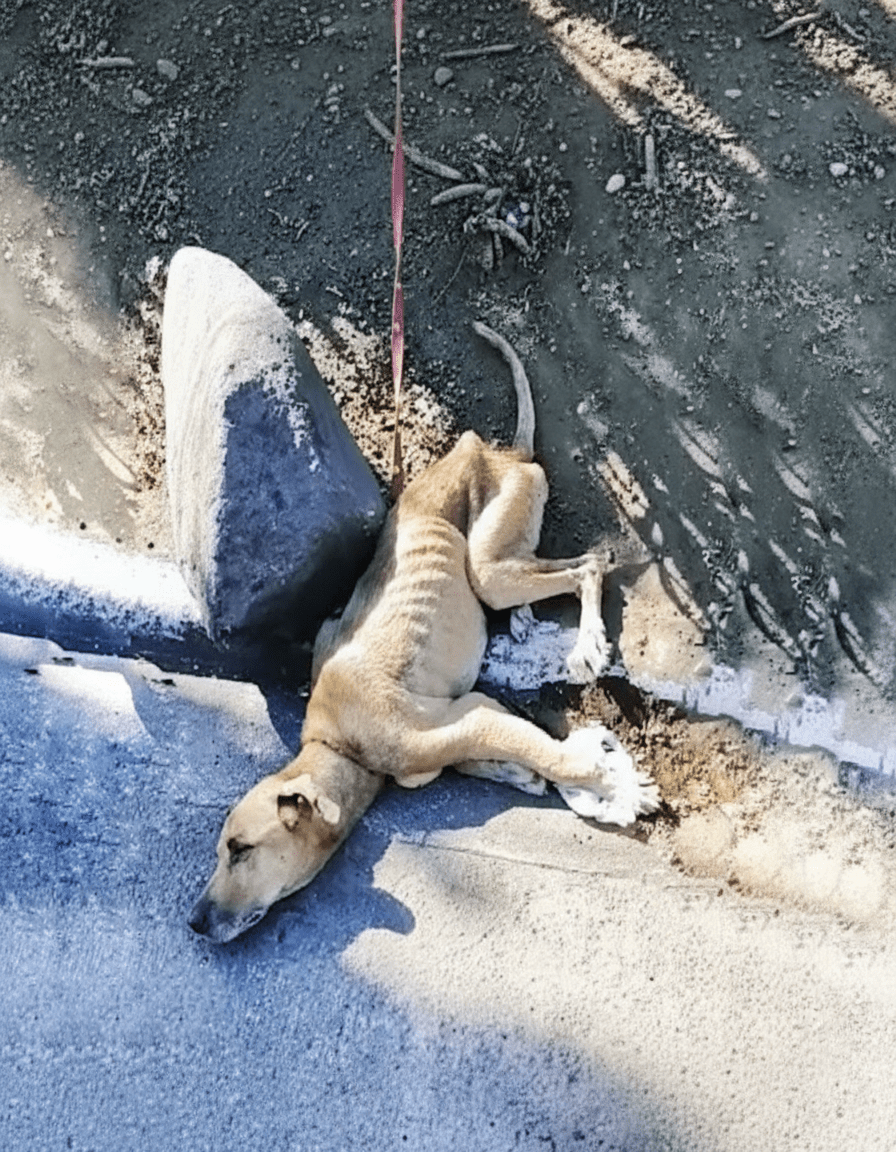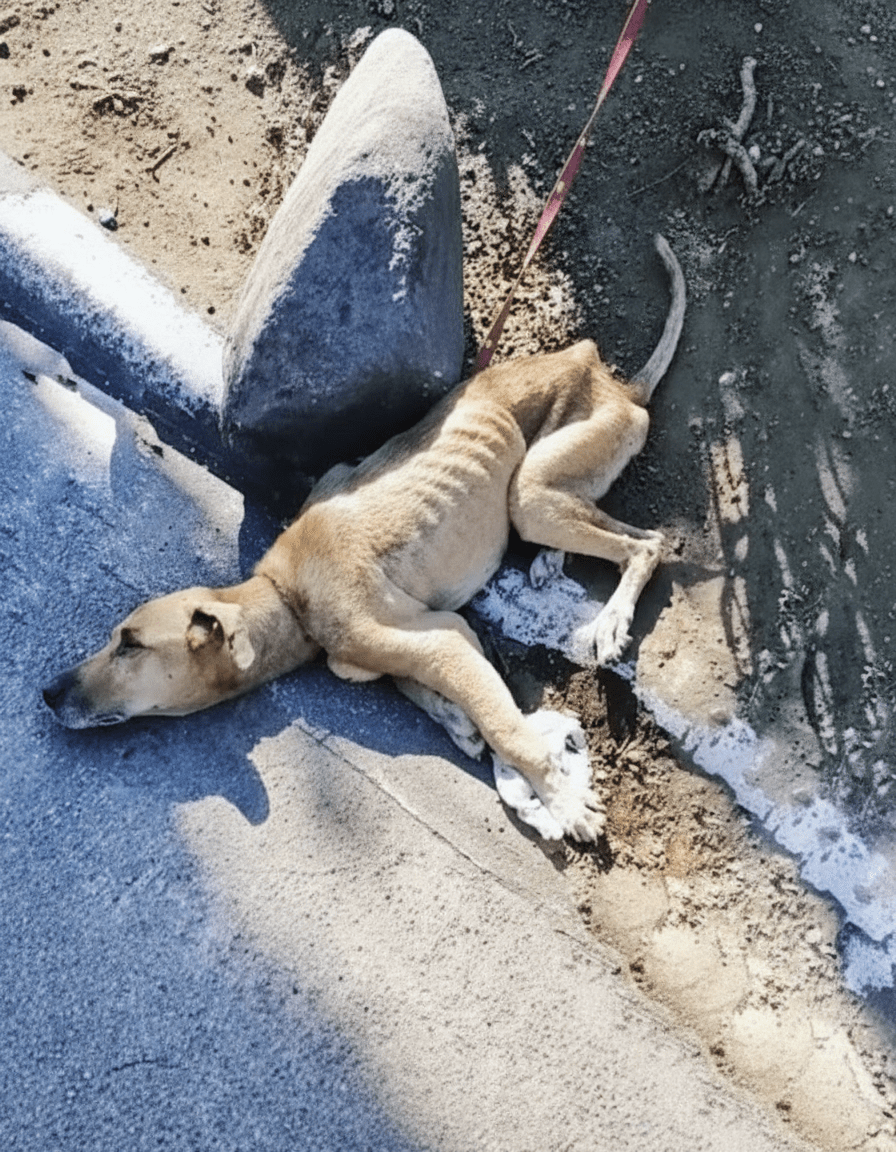In the blistering summer of 2024, on the sun-scorched outskirts of Thessaloniki, Greece, a skeletal dog lay curled against a crumbling concrete planter beside a half-abandoned petrol station on the old coastal road to Halkidiki. Local commuters had noticed the animal for weeks—ribs protruding like the ribs of a forgotten shipwreck, fur matted with engine oil and dried blood, one hind leg swollen from an untreated fracture. No one stopped. The station itself had shuttered months earlier after its owner fled debts to Germany, leaving behind rusted pumps and a colony of feral cats. Amid the stench of spilled diesel and rotting bougainvillea, the dog—later named Magma for the volcanic will to live that still smoldered inside him—had chosen the narrow strip of shade between a toppled Esso sign and a pile of shattered ceramic tiles. His eyes, clouded with conjunctivitis, stared blankly at passing trucks. When a municipal worker finally prodded him with a broom handle on July 19, Magma did not flinch; he simply exhaled a soundless sigh, as though surrender were the only language left. That moment, captured on a shaky smartphone video by a teenage pump attendant who had returned to collect forgotten tools, would travel 2.4 million views across TikTok and Instagram within 48 hours, igniting an international rescue chain no one could have scripted.

The first responder was not a veterinarian but a 62-year-old retired ferry captain named Dimitris Galanis, who happened to be driving his battered Fiat Panda to deliver olive oil to a monastery in nearby Mount Hortiatis. Galanis, a man whose own left leg had been crushed decades earlier in a winch accident, recognized the stillness of utter defeat. He pulled over, wrapped the dog in a beach towel printed with faded Santorini sunsets, and carried him to the passenger seat. Magma weighed just 11.4 kilograms—less than half the healthy average for his presumed greyhound-whippet mix. At the small municipal clinic in Thermi, Dr. Eleni Papadopoulou performed an emergency examination under a flickering fluorescent tube. Blood tests revealed severe anemia, heartworm infestation, and a calcium level so low it bordered on tetany. The fractured femur had begun to knit crookedly, forming a painful pseudo-joint. “He was minutes from multiple organ failure,” Dr. Papadopoulou later told local reporters. “But the strangest detail? His tail still held a single white tip, pristine, as if some part of him refused to let the grime win.”
Word spread through Thessaloniki’s tight-knit animal welfare WhatsApp groups. Within hours, a crowdfunding page titled “Magma Must Live” raised €4,300—enough for surgery, antibiotics, and a month of critical care. Yet the story’s first twist arrived at 2:17 a.m. the following day. A message pinged from Adelaide, Australia: a woman named Sophie Nguyen claimed the dog was her childhood pet “Marble,” stolen from her family’s backyard in 2019 during a home renovation. She sent photos—same white tail tip, same crescent scar above the left eye. DNA swabs were overnighted via DHL. While volunteers debated logistics, Magma refused food. Veterinary nurses tried minced lamb, sardines, even warmed milk laced with honey. Nothing. On day four, a janitor at the clinic named Kostas played a YouTube video of crashing Aegean waves on his phone; Magma’s ears twitched. By day six, he accepted a single lick of watered yogurt from the fingertip of a ten-year-old girl visiting with her grandmother. The girl, astonishingly, was the clinic director’s niece, holidaying from Toronto—her first trip to Greece in eight years.
Surgery to repair the femur took place on July 29 in a repurposed operating theater at Aristotle University’s veterinary faculty, donated pro bono after a viral tweet by a Canadian-Greek cardiology student reached the dean. Surgeons inserted a titanium plate etched with the serial number 070124—the date of Magma’s rescue. Recovery, however, stalled. Infection set in; fever spiked to 40.2 °C. For 72 hours, volunteers took four-hour shifts, cooling him with ice packs wrapped in tea towels embroidered with the evil eye. At the lowest point, Magma’s heart rate dropped to 42 beats per minute. Dr. Papadopoulou prepared the euthanasia consent form. Then, in a detail that still baffles the team, the clinic’s ancient air-conditioning unit—installed in 1983 and held together by duct tape—groaned, sputtered, and inexplicably blasted a ten-second gust of frigid air directly onto Magma’s face. His eyes snapped open. His tail thumped once. Twice. The fever broke six hours later.
Physical therapy began in a children’s hydrotherapy pool at a shuttered resort in Nea Michaniona, secured through a cousin of the mayor who owed Galanis a favor from their navy days. Twice weekly, Magma floated in warm saltwater while a physiotherapist from Lisbon—on sabbatical to study Mediterranean rescue networks—guided his legs through range-of-motion exercises. Between sessions, he stayed with a foster family in Kalamaria: an Iraqi refugee couple, Noor and Hassan, who had fled Mosul in 2016 and now ran a tiny falafel stand. Noor sang him old Arabic lullabies; Hassan built a ramp from discarded olive crates so Magma could watch sunsets from the balcony. Neighbors, initially wary, began leaving tins of pate and knitted sweaters. One pensioner, a former opera singer named Fotini, read aloud from Homer each afternoon—Magma’s ears pivoting at the rhythm of dactylic hexameter.
The DNA results arrived on September 12: 99.997% match. Marble and Magma were the same dog. How he traveled 13,000 kilometers from Adelaide to Thessaloniki remains a mystery. Shipping manifests show no record. Microchip databases list him as deceased after a 2020 shelter fire in South Australia. Theories range from stowaway on a container vessel to deliberate theft by a ring trafficking greyhound bloodlines. Sophie Nguyen booked the next flight, arriving with her now-12-year-old son who had never stopped drawing pictures of the missing dog. Their reunion at Thessaloniki Airport—filmed by a local news crew—shows Magma limping across the arrivals hall, tail wagging in perfect 3/4 time, collapsing into the boy’s arms as flashbulbs pop like summer lightning.

Yet the story refused a fairy-tale ending. Greek bureaucracy demanded quarantine; Australian biosecurity required further tests. Magma spent October in a kennel outside Athens, his titanium leg now a minor celebrity on veterinary forums. Fundraising surpluses—totaling €18,700—were redirected to spay-neuter campaigns in Thessaloniki’s Roma neighborhoods, where stray populations had surged after tourist lockdowns. Dr. Papadopoulou used the platform to lobby for a national animal abuse registry, citing Magma’s X-rays in parliamentary hearings. On November 3, 2024, Law 5162/2024 passed, mandating microchip scans at all border entries and increasing penalties for abandonment.
Magma—still answering to both names—finally boarded a Qantas flight on December 4, upgraded to business class after the pilot, a dog lover from Perth, recognized him from viral footage. In Adelaide, he now patrols Sophie’s backyard, barking at magpies with a slight limp that clicks like a metronome. The white tip of his tail remains untouched by grime, a tiny flag of resilience. Back in Greece, the petrol station has been demolished; in its place, a community garden blooms with pomegranate trees and a bronze plaque: “Here lay Magma, 19 July 2024. He reminded us that even ruins can grow.”
His journey illustrates a global truth: rescue is rarely linear. It zigzags across continents, languages, and generations, stitched together by ferry captains, falafel vendors, opera singers, and children who believe drawings can summon lost dogs home. Magma’s first tail wag—recorded on September 1 at 07:14 a.m. by a Portuguese physiotherapist’s GoPro—lasted 4.2 seconds. It was not the end of suffering but the beginning of trust, a microscopic earthquake that shifted tectonic plates of compassion from Thessaloniki to Toronto to Adelaide. Today, that video loops on screens in vet clinics worldwide, a silent reminder: sometimes the smallest motion rewrites an entire future.






